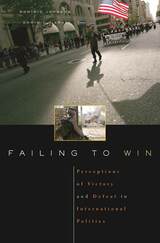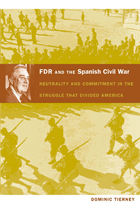
How do people decide which country came out ahead in a war or a crisis? Why, for instance, was the Mayaguez Incident in May 1975--where 41 U.S. soldiers were killed and dozens more wounded in a botched hostage rescue mission--perceived as a triumph and the 1992-94 U.S. humanitarian intervention in Somalia, which saved thousands of lives, viewed as a disaster? In Failing to Win, Dominic Johnson and Dominic Tierney dissect the psychological factors that predispose leaders, media, and the public to perceive outcomes as victories or defeats--often creating wide gaps between perceptions and reality.
To make their case, Johnson and Tierney employ two frameworks: "Scorekeeping," which focuses on actual material gains and losses; and "Match-fixing," where evaluations become skewed by mindsets, symbolic events, and media and elite spin. In case studies ranging from the 1962 Cuban Missile Crisis and the current War on Terror, the authors show that much of what we accept about international politics and world history is not what it seems--and why, in a time when citizens offer or withdraw support based on an imagined view of the outcome rather than the result on the ground, perceptions of success or failure can shape the results of wars, the fate of leaders, and the "lessons" we draw from history.

Between 1936 and 1939, Roosevelt’s perceptions of the Spanish Civil War were transformed. Initially indifferent toward which side won, FDR became an increasingly committed supporter of the leftist government. He believed that German and Italian intervention in Spain was part of a broader program of fascist aggression, and he worried that the Spanish Civil War would inspire fascist revolutions in Latin America. In response, Roosevelt tried to send food to Spain as well as illegal covert aid to the Spanish government, and to mediate a compromise solution to the civil war. However unsuccessful these initiatives proved in the end, they represented an important stage in Roosevelt’s emerging strategy to aid democracy in Europe.
READERS
Browse our collection.
PUBLISHERS
See BiblioVault's publisher services.
STUDENT SERVICES
Files for college accessibility offices.
UChicago Accessibility Resources
home | accessibility | search | about | contact us
BiblioVault ® 2001 - 2024
The University of Chicago Press









